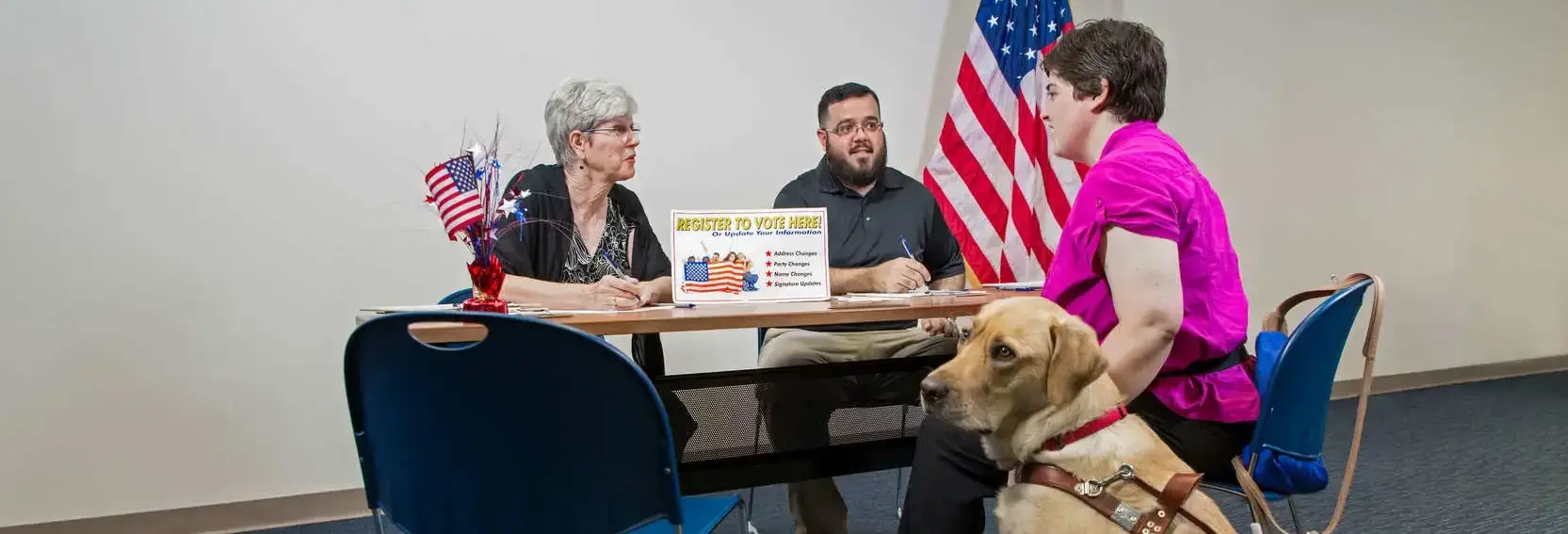Guardianship was designed to help people who are unable to manage their personal affairs without assistance. Guardians can make decisions regarding finances, appropriate living environments, and even with whom an individual under guardianship can have relationships. While the intent is to aid those deemed incapable of caring for themselves, this help has a heavy cost for those placed under guardianship. People under guardianship lose the right to make their own decisions. Depending on the type of guardianship, an individual under guardianship often loses their right to vote.
The Issue
One of the main tenets of American democracy is the belief that once an individual becomes an adult, they are capable of making their own decisions; they can sign contracts, choose where to live, go to school, and work, and they are granted the right to vote. However, it is a common belief that people with disabilities are incapable of making their own decisions regardless of whether their disability has any impact on their decision-making abilities. This stigma surrounding disability particularly affects those with developmental and intellectual disabilities who are commonly placed under inappropriate and overly restrictive guardianships. Approximately 1.3 million Americans with disabilities are directly affected by guardianship.
Why it Matters
Federal laws, including the Americans with Disabilities Act (ADA) and the Help America Vote Act (HAVA) were intended to protect the civil rights of people with disabilities, including the right to vote. However, these laws, specifically HAVA, focus more on guaranteeing physical access to voting rather than discriminatory competency requirements that can also create barriers to voting for persons with disabilities. These policies can be challenged under Title II of the ADA “if they remove the right to vote from individuals due to disability or supposed ‘mental incompetence’ despite there being no specific finding that the person lacks the ability to make decisions specific to voting.”
Those who seek to have their voting rights restored are often held to a higher standard than their non-disabled peers with courts requiring them to explain the process they would use to determine for whom they would vote. This practice is a violation of The Voting Rights Act “which prohibits states from applying restrictive and unequal tests to determine who is qualified to vote.” Even though there is a process for rights restoration in every state, rights restoration is rarely pursued due to its complexity and those subject to guardianship are not consistently provided information regarding how to have their rights restored. Rights restoration can also be cost prohibitive for those with private guardians. Since the guardian is paid by their estate, the person under guardianship must pay for their own attorney’s fees as well as the attorney fees for the guardian who might contest having their rights restored.
Take Action for Change
Guardianship is a complex issue that sometimes pits the right of personal autonomy against personal safety. There are some actions that can be taken at the federal and state level to prevent individuals from being inappropriately placed under guardianships, or overly restrictive guardianships.
- The Department of Justice (DOJ) should issue guidance to states reminding them of their legal obligations under the ADA. Guidance to states should emphasize:
- The applicability of the ADA to guardianship proceedings.
- That capacity is not determined by the need for assistance with activities of daily living or with making decisions.
- Less restrictive alternatives to guardianship, such as Supported Decision-Making, should be considered before placing an individual under guardianship.
- Judges should be trained in the availability of alternatives to guardianship such as Supported Decision-Making.
- To ensure that individuals facing guardianship receive due process:
- Legal representation, who will advocate for the individual’s wishes, must be provided.
- A state guardianship court improvement program should be funded to help courts develop best practices, train judges and court personnel on due process rights and less-restrictive alternatives to guardianship.
- The type of disability that is believed to be the cause of an individual’s inability to make decisions should not affect the degree of due process provided in a guardianship case – such practices are discriminatory under the ADA.
